
The sad demise of local journalism
When was the last time you – or anyone you know – stood at the gates of a cemetery collecting names of mourners as they left a funeral?
When did you last attend a parish council meeting or magistrates’ court? Or call into a local police station for a chat (rather than to hand in your drivers’ documents) or check the upcoming weddings at the register office?
Do you still look at the postcards in newsagents’ windows and check the village notice board?
Indeed, have you the faintest idea of what I’m on about?
For generations of journalists, being soaked through or bored throughout were the price to be paid to learn their craft. The lessons were given not by university lecturers, but by wiser older hands (sometimes as old as 23) who knew all about the fêtes worse than death, that brides were more likely to carry a bouquet of freesias than fuchsias, that rain never dampened the enthusiasm for anything and that the lady mayoress was frequently to be seen sharing a joke. The biggest lesson of all was that faces and names sold papers – and that those names must always be spelt correctly.
The way it used to be
Forty years ago, a weekly newspaper serving a medium-sized market town could expect to have a circulation of between ten and fifteen thousand. It would be staffed by an editor, a news editor, a chief reporter, half a dozen reporters, a sports editor, a couple of photographers and three or four subs. There might also be a feature writer, often an older woman working part-time.
Nearly all of the reporters would likely be juniors – indentured trainees who would serve three years before taking their proficiency test. Some would stick to news reporting, others would find a niche in sport or features or even subbing. Some in bigger newspaper groups would move around during their indenture period so that they would taste life on a daily early in their training. Most would seek to move on once they had that proficiency certificate in their hands. The fundamental skills they had learnt would be expected everywhere; all the ads used the same phraseology: reporters had to have a talent for finding off-diary stories; subs must always be fast and accurate.
The young journalists would move from weeklies to evenings to bigger evenings. Some would choose the executive route and find their place in the community as the editor of the local paper; for others, Fleet Street was the dream. The ambitions were equally honourable – if not equally remunerated – and the result was that Britain had a thriving newspaper industry populated by well-trained journalists.
For those happy to stay in what were then known as the provinces, there were plenty of jobs and opportunities.
You may like to sit down before you read the next par.
In 1970, the Birmingham Evening Mail had a circulation of 400,000 and employed 113 journalists: 30 newsdesk and reporters, 25 district reporters, 23 news subs, 15 features staff, 20 sports staff and 9 photographers.
There are national newspapers today that struggle to match that level of staffing.
Then came the freesheets and the landscape changed.
People are fickle: readers cancelled their orders for the paid-for weeklies and the freebies flourished. Village stringers were as happy to send their snippets to the newcomers as to the old rags – and sometimes preferred to, since the freesheets’ smaller staffs (often ad reps doubling up to perform editorial tasks) wouldn’t have the time or inclination to rewrite them. As time went by, readers became convinced they were getting something almost as good as they'd always had – and for nothing.
The local press struggled; advertising ratios grew, so that the papers became almost as ugly as the upstart rivals; costs had to be cut. Newspapers that had been run by local businessmen for reasons of altruism or influence were sold into groups that got bigger and bigger. Some paid-fors took the ‘if you can't beat them’ approach and went free.
The freesheet didn’t kill the local rag. It survived to fight another day. But only just. And then along came the internet. The decline since then has been relentless – a DCMS committee report at the beginning of this year said that 320 local newspaper titles had disappeared in the ten years to 2019 – and now it looks terminal.
Influencers & celebrities
Last week, Reach announced its third round of job cuts in three years. In the aftermath of the inevitable outcry, the company had to deny that it intended to replace journalists with influencers. How did we get to a situation where such an idea is deemed sufficiently credible to demand a denial?
Well, radio stations are a long way down the road of replacing seasoned presenters with “stars” – BBC’s 6 Music has Cerys Matthews, Guy Garvey, Iggy Pop and Cillian Murphy (who clearly doesn’t have enough on, acting in blockbuster films and TV series) to name but four. The “anyone can do it” mentality is rife across the media, and a familiar name is a bigger sell than a low-profile professional who has learnt their craft from their teens.
That is not to say that Garvey et al are not good broadcasters. They are. Nor is it to say that people shouldn’t switch careers as Matthews has done. But the other three are all still doing their (lucrative) day jobs. And while they are moonlighting, they are taking a slot that might have been available to someone for whom a career in radio was The Job, not a sideline.
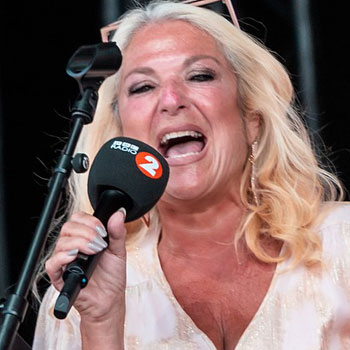
The same applies to television – look at GB News with its stable of MP presenters – and to newspapers, with their celebrity columnists. Indeed, there’s quite the crossover, with Richard Madeley presenting for GB News and writing an agony uncle column for the Telegraph, Nadine Dorries writing for the Mail and presenting on Talk TV, Vanessa Feltz on Radio 2 and in the Express. So that jolt at the need to say, “We’re not replacing journalists with influencers” was misplaced – because the notion is all too believable when you think about it.
And if we should be reassured by the promise that Instagram stars won’t be taking reporters’ jobs, what about AI? Because we can be pretty sure it will take at least some of them.
The big squeeze
It’s a gloomy picture. Publishers have to do something to stay in business. And what they are doing is squeezing. Squeezing staff levels, squeezing salaries, squeezing expenditure on such luxuries as offices. How many towns now have a local paper office where you can just walk in with a tip for a news story or to place a classified ad? Ten years ago, I wrote, with some dismay, about “local” newspapers being edited from 50 miles away and the advent of subbing “hubs” that were sometimes in a different country, let alone county, from the town the paper was supposed to be serving. Now 50 miles is nothing. And who even thought a newspaper needed its own editor?
The Newsquest chief executive Henry Faure Walker gave an interview to Press Gazette last week about how his group was “bucking the trend in terms of industry decline”. Newsquest is the second biggest regional publisher with 200 titles, a reported 50 million digital readers per month and a print readership of five million per week. Revenue was up last year, although it was expected to fall this, and the business was in profit. And what was the secret? “I think probably the benefits we’re seeing come from a very locally-focused strategy.”
Hurrah! But hang on a minute, that locally-focused strategy is all about advertising. Local salespeople. Setting up a local digital marketing agency.
What about the journalism then? Well, they’re experimenting with AI and have developed their own “copywriting tool”. A press release from a “trusted source”, such as council minutes, is entered into the computer (how and by whom?) and then the “engine” is asked to “run 300 words in the style of local newspaper article and [told] I think the headline is this”.
Faure Walker adds, not entirely reassuringly, “It has human scrutiny all the time”, before expanding: “it’s pretty effective for run-of-the-mill, press release, local community news, positive stuff that is factually reliable that the journalist actually probably hadn’t time to do”.
I’m weeping as I type this.
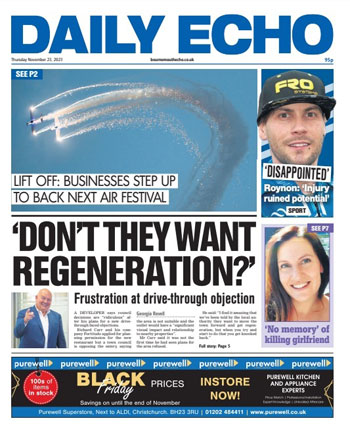
The journalist probably hadn’t time to do journalism? Is that surprising? Faure Walker notes that the Bournemouth Echo has 20 editorial staff. That’s fewer journalists to produce an evening paper and website serving a town of 200,000 people (plus those in neighbouring villages) than we had on my first little weekly. And they have to do all the typography for both, plus social media. And, no, we didn’t all sit around drinking coffee all day or take long, lazy lunches in the pub. We got out of the office and did our jobs, day and night. Though there was downtime on a Thursday afternoon after the paper was offstone and Ted had been round with the little brown envelopes containing about £10 in small notes and coin (that’s £142 in today’s money).
Now let’s go back to Reach, whose titles include such heavyweights as the Liverpool Echo, the Manchester Evening News and the Birmingham Mail – the one with all those staff in 1970. Back then, its circulation was 400,000. By 2004, it had shrunk to a quarter of that and now stands at 5,600. Yes, 5,600. The MEN has gone from 140,000 to 8,300 over the past 20 years and the Liverpool Echo from 129,000 to 13,000. If “decimation” is the loss of one in ten, what is the word for the loss of nine in ten?
A meagre offering
And what are these papers serving up to their diminishing readerships?

Well, Tuesday’s Mail front page was a splendid anniversary tribute to the victims of the 1974 pub bombings, reminding readers that the real bombers have never been prosecuted or convicted after the miscarriage of justice that saw the Birmingham Six jailed and released years later.
The Liverpool Echo was less impressive. Monday’s paper led on the death of an elderly woman in Kirby (a no-text splash that cross-reffed to the wrong page). Page 3 was an interview with glamour model Danielle Lloyd, who came third in the Celebrity SAS reality show (Gareth Gates won, with Matt Hancock second) and page 5 a comment piece about government cuts, based on the death (we don’t know when) of a man who had wrongly had his benefits taken away. There were featury news stories about a transgender woman and a PE teacher who was going to compete in the world bodybuilding championships and a conventional feature on a former private eye. The only other local news stories were about proposed dog controls, a woman facing eviction, a couple of crime reports and an upcoming Paddington Bear show – oh, and three nibs. A grand total of 14 items, including briefs. Some of these were interesting enough reads, nicely people focused, but the paper didn’t seem particularly informative. It certainly didn’t convey the vibrancy of a city of half a million.
A terrible reading experience
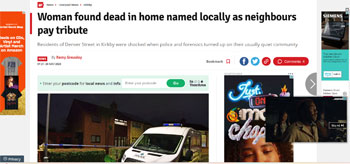
The dearth of material was even more pronounced on the “Live” website, where the home page was dominated by football – as well it might be, with the Everton points docking and Liverpool about to play Manchester City. Here we found several versions of the Kirby death, including one that got the road name wrong. Trying to read it was a nightmare, with pop-ups and flashing ads all over the place, plus a static ad or a “now read this” link to a different story between every single paragraph. This is, sadly, par for the course for too many “news” websites, as is the pale imitation “sidebar of shame” down the right that is home to national and international celebrities and has virtually no local content at all.

It's not fair to pillory the Echo – which upped its game later that day with the verdict in the long-running Ashley Dale murder trial (and produced a good print edition majoring on the case the next day). The unpleasant browsing experience and the lack of proper news is standard, to the extent that on that same morning, three of four featured stories on the Manchester Evening News site were one and the same event.
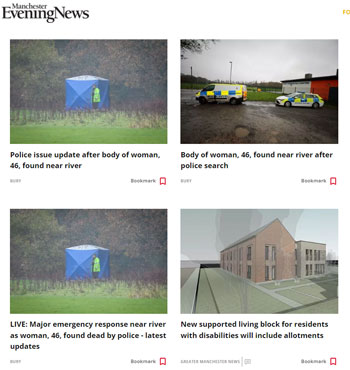
Rather, I am trying to point up the way journalism and journalists have been downgraded in the quest for clicks that businesspeople who may not understand news seem to think are the secret to financial success – or at least survival. Is this really the way we want our local news? Do those purveying it really believe that their templated websites with their dancing adverts are the way to attract and engage readers?
We know the media ocean is turbulent and frightening, but while the three leviathans that dominate the local press are cut, cut, cutting and abandoning traditional feeding grounds, hyperlocal minnows are venturing into the water – and some of them are doing very nicely thank you.
I know I sound like a sentimental old woman, but local newspapers matter. Royal Mail is not allowed to give up deliveries to homes just because they are difficult to reach; bus companies are not allowed to abandon rural services and cream off the profitable urban routes.
Why all this matters
I’m not suggesting that newspaper businesses should be regulated in the same way – you cannot force a private enterprise to provide a potentially loss-making service – but I am saying that those rules for the mail and the buses are there because local communities matter. It is important that people are able to keep in touch and feel part of the area where they live, to be able to reach friends and neighbours in person or through letters, papers, phone calls and, yes, online social networks.
To produce a decent local newspaper, you need reporters and those reporters need to have proper contact with their readers and the community leaders. They need to go to those boring council meetings, not just to take notes, but to chat to people afterwards, to get the stories behind the stories. They need to maintain contact with the local police, the village shopkeeper. They need to be in court for all cases, not simply when they’ve been tipped off that there’s an important or juicy one coming up. And if they don’t build their contacts, they won’t even get the tips for those.
We had to fight in the 1970s for the right to remain in council chambers to hear all the discussions. Councils used to be allowed to vote to go into camera and exclude the press without explanation. As a young reporter, I had to stand and challenge such a vote when the law changed, to seek an explanation for why what they were about to discuss was not fit for public consumption. The new rules were effective; government became more open.
And, now, we can’t even be bothered to turn up. Or rather we can't afford the time to turn up. If you’ve got to write up the Basildon charity fun run, the A12 car crash, the Maldon regatta and the Colchester factory strike, you’ve barely got time to ring the Stebbing parish clerk about last night’s meeting, let alone consider attending in person. Especially when you’ve got to update the web page, tweet and share your wares on Instagram.
So, fewer and fewer stories are covered, and almost always over the phone. And the contacts who tell us what happened are the people with the vested interest in seeing the story slanted in a particular way – look back at that Faure Walker quote about council minutes being a “trusted source”. Justice and democracy at their basic levels are not seen in action.
Local newspapers have always been produced largely by youngsters with aspirations. Those village calls have always been a chore, the staid writing style constraining. But this is about providing a service, about learning to deal with people, about being grounded and disciplined. If local papers become digital wannabe redtops with slang headings and endless celebs, there will be no use for them. And that matters.
It matters because millions of people are being denied basic information about their communities as publishers resile from telling people what they need to know in favour of snippets of what they think they are interested in. It feels like all pud and no veg. And it matters because this slapdash approach will drag down the national press. If local papers do not produce decent ethical journalists with basic skills, who will? National papers have set up their own graduate training schemes, but these are open to only a relative handful of the smartest young men and women.
There are 50 applicants for every graduate post and the universities are turning out more media graduates than there are journalists employed across the entire industry. That means there’s an army of young people with certificates saying they know what they’re doing. But how can they find out for real? Everyone can learn a certain amount from the classroom, but there is still no substitute for what used to be called on-the-job training and where are these youngsters going to get that?
How will they learn how to interview a woman whose five-year-old son has just died in the village pond? Will they understand the importance of shining a light on what’s going on in the Mayor’s Parlour? They need to. Both because it matters and because one day they may move on to a bigger stage and have to interview the woman whose son has just been killed in a terrorist bombing. Or look into shady dealings in Downing Street.
Or maybe everyone will just get AI to recast that government press release into the paper’s style.
After all, some national newspapers are already doing that, without the help of ChatGPT.
The under-reported case of Ujeza Kurmekaj
Well, that was a bit of a rant. So, let’s have a break with a few snappier bits and pieces from the nationals (keeping well clear of the Autumn Statement), starting with a case in point – that of Ujeza Kurmekaj, an Albanian woman who helped people smugglers to arrange the small boat crossings that are so exercising our politicians and our newspapers.
Kurmekaj was arrested at her home in Banbury in October last year. She was charged in September and appeared at Oxford Crown Court last month when the case was adjourned because there was no interpreter available to help her understand what was being said. She was expected to face a three-day trial in February and a pre-trial hearing was arranged for November 3. But at that hearing, she admitted charges of facilitating illegal immigration and sentencing was set for last Friday, when she was jailed for seven and a half years.
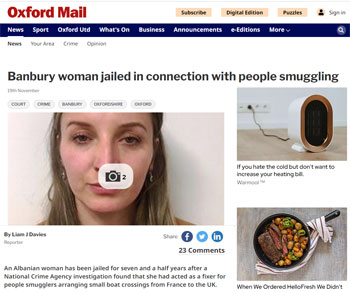
No national newspaper reported the arrest. No national newspaper reported on the October or November 3 hearings. No national newspaper reported on the sentence – until three days later. And when they did, their efforts looked a lot like an Oxford Mail report from the previous day – a Sunday.
The delay in publishing and the fact that the report had no direct quotes from the prosecution or defence and no sentencing remarks from the judge all suggest that there had been no reporter in court. Probably because there had been no reporter in court on the 3rd, when only a procedural hearing had been expected. Without even a follow-up call to check that the trial had been set, that would mean that the Mail was unaware that she’d fessed up and that the case would conclude on Friday.
Did the nationals lift the Mail copy (or the reporter sell it on)? That wouldn’t be unusual, but in this case it’s more likely that they were just monitoring Twitter. For every report, including the Oxford Mail’s, bore an uncanny resemblance to an item on the National Crime Agency website, which was tweeted out, along with a video of the arrest, at 10.29 on Sunday morning.
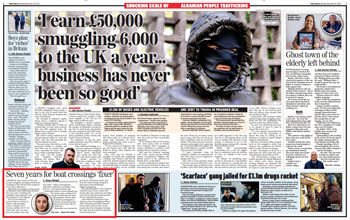
So, all media coverage – local and national press, TV and radio – was based on what a spokesman for the National Crime Agency had to say after the event. (Very conveniently for the Express, which ran a spread on Albanian people-smuggling on Monday.) Everyone used the same details, the same ready-made quotes. Not one outlet added an ounce of anything different. Not one outlet made a call or looked an inch further into the story. Was she the first or the fiftieth to be prosecuted / convicted? That Express spread was focused on what was happening in Tirana, but how much of this cruel industry of people-trafficking is directed from here at home? Who knows? Nobody asks.
How can this happen? How can a court case so directly relevant to the biggest political controversy of the past six months not be picked up and reported independently by anyone? I think you know the answer.
An Albanian woman has been jailed for seven and a half years after a NCA investigation found that she had acted as a fixer for people smugglers arranging small boat crossings from France to the UK.
— National Crime Agency (NCA) (@NCA_UK) November 19, 2023
Read more??https://t.co/PhxTnBolS3 pic.twitter.com/8Gi2MDPMQA
Cameron’s return

Now for that reshuffle.
The return of David Cameron worked a treat in deflecting from the sacking of Suella Braverman and denied her a headline for a day at least. The Times leader described it as “unpredictable and unpredicted”, though its own Steven Swinford had reported in 2018 that the former PM had his eye on the Foreign Office. Still, it came as a surprise when it happened, so we’ll let the leader writers off.
Not the splash headline writers at the Express though. Shock and awe? Are memories so short that they don’t remember what that phrase was coined for? And not only was it in questionable taste, it was also inapt. There was certainly shock, but where was the awe? Nowhere to be seen.
Meanwhile the Mail, that most professionally produced paper in the land, managed a rookie error with its mismatched front-page portraits of Cameron and Esther McVey. It’s a simple rule: the eyes should line up and the faces be roughly the same size.
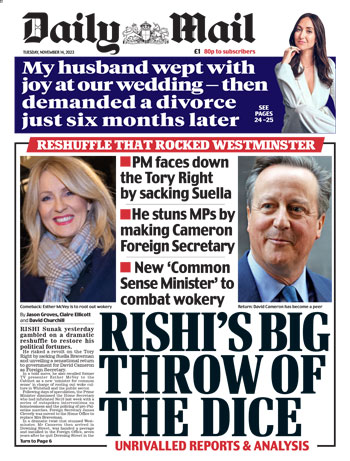
Braverman wasn’t the only minister leaving government: Thérèse Coffey said farewell to the environment department, to be replaced by demoted health secretary Stephen Barclay. You might think that this appointment would be of interest to The Times with its Clean It Up campaign to improve the quality of our rivers and seas. Especially in a week that brought the disclosure that Thames Water had dumped 72 billion litres of sewage into the river in the past three years. But no, barely a sentence, and certainly no “what’s in his in-tray”, “how will his approach differ” analysis. It’s called joining the dots. The Times didn’t.
At least in the general course of events, the Times does seem to think that the pollution is the key issue. In contrast with the Telegraph, whose leader said that Barclay’s task would be to “defuse the row over water quality and sewage”. Not to deal with the pollution then? Just to stop people arguing about it.
Other supermarkets are available

One of the more heartening stories of the past fortnight was the news that the Booths supermarket chain was getting rid of its self-checkout tills. For our Londoncentric newspapers, this was a niche story, given that Booths operates well north of Watford Gap. By way of explanation for its Home Counties readership, the Times described the chain as “the Waitrose of the North”. How patronising can you get? Has it decided that no one outside of the M25 buys the paper? And even if that were so, does it not think that its southern readers move around the country, that they might perhaps holiday in the Lake District? And if they don’t, why so many Weekend section guides to the best walks, the best pubs, the best guest houses there?
But, hold on. It wasn’t just the Times. The phrase was also in the Telegraph, the Mirror, the Star, the Mail, the Express, the Sun, the i …all saying it was “dubbed the Waitrose of the North”. By whom? Perhaps by Booths itself, in the press release? Send for AI to convert it into house style.
The best read on the subject came from the Independent’s Chris Blackhurst, who clearly loves Booths and says it’s nothing like Waitrose: “the branches are airier, tending to be out of town with picture windows affording views of the surrounding fields and fells”.
But the gold star goes to the Daily Star for its splash headline “Unexpected human in the bagging area”. Perfect.
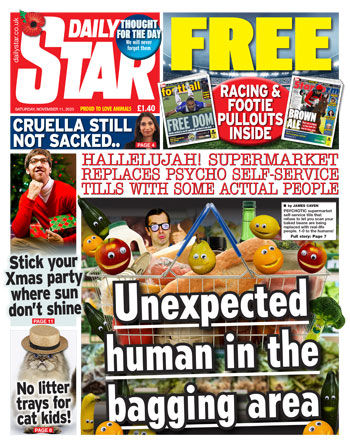
French visas: raising false hopes

The Telegraph may be Brexity, but it knows its readers. An awful lot of them go on holiday to France, and a good few of those have homes over there. So it was on point last week with a front-page story headlined “France visa boost for British homeowners ‘punished by Brexit’”. Gosh! The notion that there might be downsides to Brexit isn’t one that has troubled the paper much, but let’s get over the shock of that and down to the nitty gritty of this “boost”:
“France’s 90-day visa rule could be relaxed for British citizens who own a home there after French politicians said they had been “punished by Brexit’,” read the first paragraph. Ah, that sits more happily with the prevailing narrative that nasty foreigners were punishing us for leaving the EU.
But tell us more…
Since Brexit, Brits have been able to stay in France without a visa for only 90 days in every 180. Now there’s an immigration bill going through the French parliament and the second chamber has voted through an amendment to give people with homes there an automatic right a long-stay visa.
Does that mean it’s going to happen? Not really. Because, as in this country, the bill has to go back to the lower chamber for debate and the amendment might not survive. Rather as Lords amendments fall when they go back to the Commons. And the Macron government is not backing the amendment, saying there is already a mechanism in place for Britons to stay longer than the 90 days (by applying for a temporary long-term visa). Even the woman who promoted the amendment in the Senate expects it to fail, describing the upper house vote as “at the very least an important first step”.
So yes, the intro was right to say the rule could be relaxed. But the likelihood is that it won’t be.
So no boost then.
Farage and Dent: old news repackaged as new

At least the second homes story was new, if not entirely honestly projected. Now let’s take a look at the Sun and I’m a Celebrity. (I’m sorry, there is no escape when almost every paper – including the Telegraph – had Nigel Farage on the front page to kick off the new series.)
Last time we noted how the Sun reheated the 16-year-old investigation into the disappearance of Madeleine McCann with minimal new information. This time it went one better: a slightly more recent story – just 13 years old – but with no new bits added. It was, naturally, an exclusive.
“Jungle Grace in jibes at Farage” announced the splash. Food critic Grace Dent had, according to the two pars of text, made “sick” jokes about Farage’s near-fatal plane crash, which “sources close to him” had described as crass. So, I rushed to pages 4 and 5 for the “full story”, which came with the headline “Bushtucker vile” and the teaser “It’s all kicking off...”
Dent had apparently tweeted: “I hope none of the people who saved Nigel Farage’s life today were pesky immigrants.” Today? Had he been in another crash on the way to Australia? Nope. She made her comment in 2010. Not exactly news then.
If ever there were an example of an editor / news editor telling a reporter “We need an exclusive about Farage and one of the other contestants for the launch of I’m a celeb” this was it.
Expect more of this. Much more.
News orchestration

Farage duly appeared on most front pages again on Tuesday, once the competition got underway in earnest. All that publicity, a seven-figure fee and an exemption from some of the most uncomfortable bushtucker ordeals. You have to hand it to him, he knows how to play the system.
He was there on the Sun cover, too. But you had to squint to see him tucked under the titlepiece. Because that day the Sun had another exclusive. A real one, this time, not something manufactured to the boss’s orders. Well, I guess in a way it was manufactured to the boss’s orders – the ultimate boss, the new head honcho, none other than Lachlan Murdoch.
President Zelensky had invited Murdoch to Ukraine for a sit-down, showing his own acute sense of how to play the PR machine when Western attention was being diverted from his war to the Middle East (or, as he put it, “blurred by other events”). Murdoch had taken with him Benjamin Hall of Fox News, who was severely wounded when his vehicle was hit by Russian fire that killed two of his colleagues outside Kyiv last year, and Sun defence editor Jerome Starkey. An interesting choice, leaving behind News Corp’s more upmarket Wall Street Journal, Times and Australian.
As I say, Zelensky knows how to pick and play to his audience and he delivered the goods in an interview in which he accused Putin of multiple assassination attempts and of stoking international unrest that could lead to World War Three. Few in the West would question such assertions. The Ukrainian leader also awarded Hall his country’s order of merit (third class) and thanked journalists, cameramen, photographers, editors and drivers who had been on the front line and helped to secure international support for his cause. Well said, that man. Journalism – good and bad – really does make a difference

Who’s to say if this interview constituted “good” journalism? It was an excellent read, well presented across the front and two spreads. But it was as orchestrated as the Rishi Sunak “we’re going to cut taxes” set piece that was dutifully splashed by the loyalist Telegraph, Express and Mail. Both leaders were seeking to control the message, by making themselves available to selected media outlets. It’s called politics.
I know which of the two stories I found more compelling – but that’s a bit of a no-brainer when you compare their rarity value. Zelensky doesn’t pop up making promises every five minutes. Every newspaper in Fleet Street would have wanted to be at that table. The Times was obviously handed some crumbs, possibly in the form of early page proofs, as it had a sober page 12 lead from the first edition.
The Express and Star picked up the story when the first editions dropped and both managed to get something in their seconds. Shamefully, neither credited the Sun or mentioned Murdoch (The Times did, of course, assiduously and repeatedly). Instead they just reported “Zelensky said…” leaving the reader guessing as to where, when and to whom. It’s shocking practice. The Mail, which – bizarrely for them – did not lift the story, would at least have been honest as to its source.

Press freedom: crocodile tears
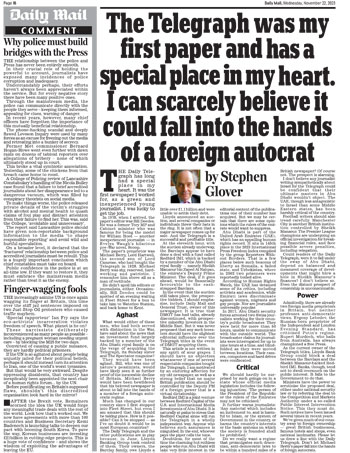
Maybe the Mail was distracted. Because it seems it’s about to lose the race to buy the Telegraph and Spectator. The Barclays are believed to have reached a deal with an American investment fund backed by the Abu Dhabi royal family to pay off outstanding loans. RedBird IMI, which is run by a former CNN chief, would then be poised to take control of the titles. Possibly as early as next month.
First, however, they will need to get over regulatory hurdles and the DCMS is urgently looking into whether such a deal would pose a threat to press freedom or national security. Abu Dhabi is, as you’d expect, muttering soothing noises – that it would be a passive investor, that it was committed to upholding the Telegraph’s standards, that it would make no investment sense to damage its reputation etc etc.
The Telegraph itself reported the story admirably straightforwardly as its business splash on Tuesday. The Mail, obviously agitated and miffed, gave it page 4 under the headline “Telegraph to face control by group backed by Abu Dhabi”. This included a strong focus on the fact that a group of Tory MPs had fired off letters expressing concerns that the Emirati royals, whose country ranks 145th in the World Press Freedom Index (the UK is 26th), might control or gain material influence over “two of the most important media publications in Great Britain”.
Stephen Glover was even more alarmed yesterday, with an oped headlined “The Telegraph was my first paper and has a special place in my heart. I can scarcely believe it could fall into the hands of a foreign autocrat”. He conceded that the Mail’s DMGT owners had also held (now discontinued) talks with potential Middle Eastern investors in preparation for its bid – but “it had never been proposed that they’d have the slightest editorial influence”. Which is, of course, what Abu Dhabi is also saying. Glover isn’t buying it: “No major British publication should be controlled by the Deputy PM of a foreign power that is a virtual dictatorship.”
This all sounds like a national catastrophe. It might well be. But it also smacks of a defeated competitor crying “foul”.
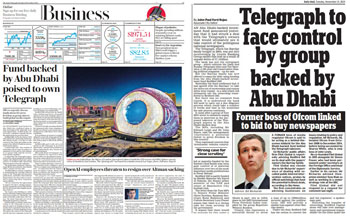
Press ownership in this country is something that seriously needs tackling. But it will never happen under the Conservatives and is unlikely to happen under any other party. We don’t need to make the situation worse – and this Telegraph takeover might do that. Or it might not. Can the reassurances about RedBird IMI operating independently be relied upon (and please do remember all those assurances about independence Rupert Murdoch gave when he bought the Times and Sunday Times)? And even if they are, would an American investment fund be the ideal owner?
Is the UAE’s position in the press freedom index relevant? The UAE’s rulers may preside over a restricted press in their own country, but financial control of two newspapers and a magazine in the UK is not the same as state control over the entire media landscape. Where is the press freedom issue here? The papers would be free to publish whatever they wished, as do all the other titles in this country that happen to be owned by foreigners or non-doms or tax exiles – which is most of them.
Are the Mail and the letter-writing Tories suggesting that the new proprietors would influence what goes in the papers? Would that automatically be a bad thing? Well, yes, I think it would. But it’s what happens and the Barclays and the Harmsworths and the Murdochs haven’t been exactly light-touch owners.
But, look, we’re talking about the UAE. They’re not the same as us. They’ll pollute our media environment and threaten our society and our freedom of expression. But surely the rest of the media could call them out if they started publishing propaganda? Because we all know that no other outlet in Britain publishes propaganda or follows an agenda. We just wouldn’t tolerate it. Would we?
I don’t know how much, if at all, we can rely on those promises. I’d prefer a nice home-grown owner for the Telegraph titles. But British people with squillions to squander on a dying industry are thin on the ground.
We’ve sold off most of our infrastructure to foreign interests – my electricity is supplied by a French firm, my trains are owned by the Dutch, my (polluted) water comes courtesy of Australians, even my favourite chocolate has been taken over by Americans. None of this has served the people of this country particularly well, but I haven’t noticed the Mail putting up much of a fight (well, it did a bit over the Cadbury takeover, I suppose).
The Mail may very well be right that the UAE is an unsuitable owner for the Telegraph – I mean, look how Manchester City has suffered under its control – but this is not a crusade (sorry, wrong whitetop) for press freedom. It’s about rubbishing the opposition.
Headline writing 101
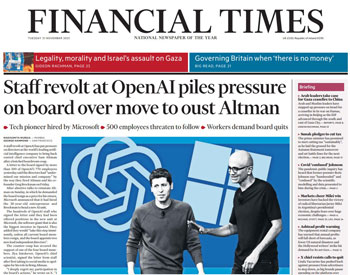
Headline writing is an art that requires an ability to read what you haven’t written; to see the second unintended meaning – I remember the genial sub who taught me at age 19 the mantra, “you have to have a dirty mind to keep the paper clean”. It stood me in good stead for 40 years. You also need to look carefully at what you have written to make sure it scans and that the reader doesn’t stumble. Sometimes innocent nouns and verbs can turn into giant potholes and they’re best avoided. Like the word “revolt”. I defy anyone to grasp Tuesday’s FT splash headline at the first attempt. We are conditioned to seeing subject, verb, object in that order. Who would not read that word “revolt” as a verb? So how does the rest of the sentence work when another verb pops up a couple of words later? It jars.
Even on a second reading, the headline writer will have seen exactly what he or she meant because that would have been what was clear in their mind. But the revise (I assume they still have them) should have recognised the problem and fixed it. Sounds fussy for a simple head that does, if you stick with it, make sense? Yes. But the FT is a proper national newspaper with a well-founded reputation for quality. It could, and should, have done better.
Great story though, and an excellent choice of splash for the market.
Lost in the business pages
Not just the business market. This was a super story and I’m not sure our press – or rather the news bosses who run the engine room – realised quite how good it was. They’ve heard of Elon Musk, of course, but do they know who Sam Altman is? The man who came second in Jim Bilton’s poll of most influential media folk?
This was no dry business story about a powerful man being sacked and then maybe coming back and then dancing off with an even bigger organisation. It was about huge personalities with massive influence, cock-ups and mutinies and exciting stuff like that. And today we have him returning home in triumph to see off all the directors who got rid of him in the first place. Absolutely tremendous.
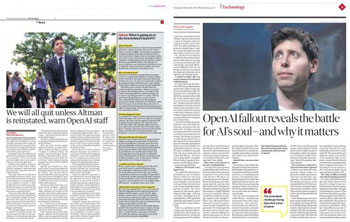
The Guardian recognised as much, putting the rebellion on page 3, while the Mail found a place for it on 12. The Scotsman got it – giving the story page 11 and a “why it matters” headline. The Telegraph, however, consigned it to a modest slot on the business front, where the paper’s own future took precedence.
And then there was the Times, which demonstrated the difficult choices when stories from “other” departments – business or sport or even the foreign desk – rise up and demand to be taken notice of. Do you “bring them up front”, where they might be given less space or “do them properly” and “let them breathe” back on their home ground? The latter argument usually wins, with the all-powerful home news operation protecting its territory.
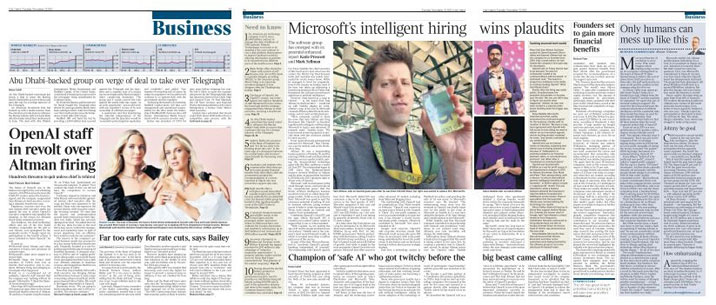
It seems to make sense, especially when you want to give decent space to the Covid inquiry and the prime minister and still keep some variety on the other news pages. Altman would have been lucky to have an entire page in the news section, whereas he got three with whistles and bells back in business. It was all there, including the brilliant headline “Only humans can mess up like this” (that’s two excellent “human” headings in one week). The trouble is, would the general reader ever see it? Without even the “Inside” nibs at the foot of the front, there is no signposting, nothing to give a hint that there is something really interesting lurking on pages 34 and 35.
I’d have made exactly the same decision, and I’d have been wrong, leaving the general reader the loser. A bolder editor would have cut Rishi down to size and moved Altman to the prime 6-7 spread. Because we all know that Sam and his AI are going to be influencing our lives a lot more and for a lot longer than Mr Sunak.
Front page of the fortnight
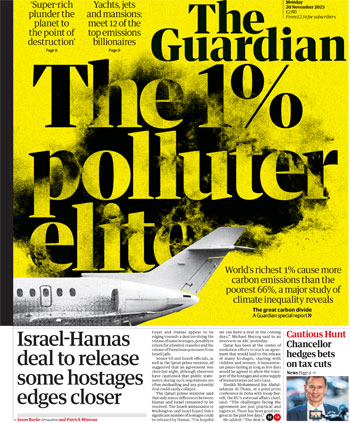
This from the Guardian was probably the most striking of the bunch, though I’m not a huge fan of the paper’s default design style for its blockbuster stories. I find the palette unappealing and the typography indigestible. But you can’t deny that it shouts, “We think this is important”.
Was it important? Probably. Though I’m not sure that it comes as much of a surprise that the wealthiest 1% pollute the planet more than the poorest 66%, any more than it was a surprise that the richest 1% had “grabbed” almost twice as much of new wealth generated since 2020 as the remaining 99%. Both statistics came courtesy of Oxfam, the former in the Guardian’s special this week, the latter in a report in January. In both cases, Elon Musk comes under fire.
The latest analysis ranks him only at number 10 in the billionaire polluter league table, yet he dominates the first inside spread with an assessment of whether the “environmentally conscious” Tesla owner is really the world’s first green billionaire. Spoiler alert: doesn’t look like it. I suppose it made sense to focus on Musk in terms of his being someone purporting to want to tackle climate change, rather as Harry and Meghan get stick over the disconnect between their “jetsetting” and their “preaching”.
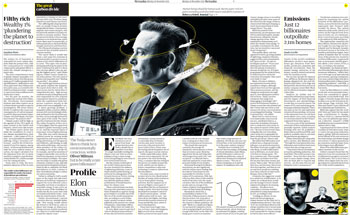
It seems that ideological antagonists Mail and Guardian have in common a contempt for what they perceive as hypocrisy – even if they’re coming at it from different perspectives. Neither is prepared to have their parsnips buttered by the fine words of self-appointed climate evangelists. How dare the rich and privileged have an opinion or even promote some initiatives to save the planet if they are not willing to surrender all the trappings of their lifestyles?
How did Oxfam determine who were the greatest polluters? By looking at their private jets, yachts, energy-hungry mansions. Yes, I get that. But also at their investments. So pollution by the businesses in which they hold shares goes on their personal debit account. Which is obviously why they are far greater polluters than the world’s poorest, who have no jets, mansions, yachts or shares. They could, of course, invest “ethically”, but they’d still be around the top of that league.
In case you haven’t seen the Guardian, the Mexican businessman Carlos Slim comes in at number 1, apparently responsible for more than six million tonnes of CO2 emissions, slightly more than Bill Gates. He is followed by Jeff Bezos, with just under 2m tonnes, ahead of the other usual suspects from Silicon Valley – Larry Page, Sergey Brin, Michael Dell, Larry Ellison, Erich Schmidt, who all hover around the million tonne mark. In other words, it looks like just another rich list, with LVMH’s Bernard Arnault in at 6 and Roman Abramovich at 8.
The world isn’t fair. We know it. Distribution of wealth and responsibility for the planet’s ills is hopelessly out of whack. We probably should keep shouting it out loud, even when it’s not going to make any difference. But without offering solutions to the fundamental problem, restating the status quo – whether it’s Oxfam or the Guardian beating the drum – achieves little. Beyond inviting charges of envy and pointless virtue signalling.
Still, it was a dramatic cover.
Liz Gerard’s Notebook is a fortnightly column published in the InPubWeekly newsletter. To be added to the mailing list, enter your email address here.












